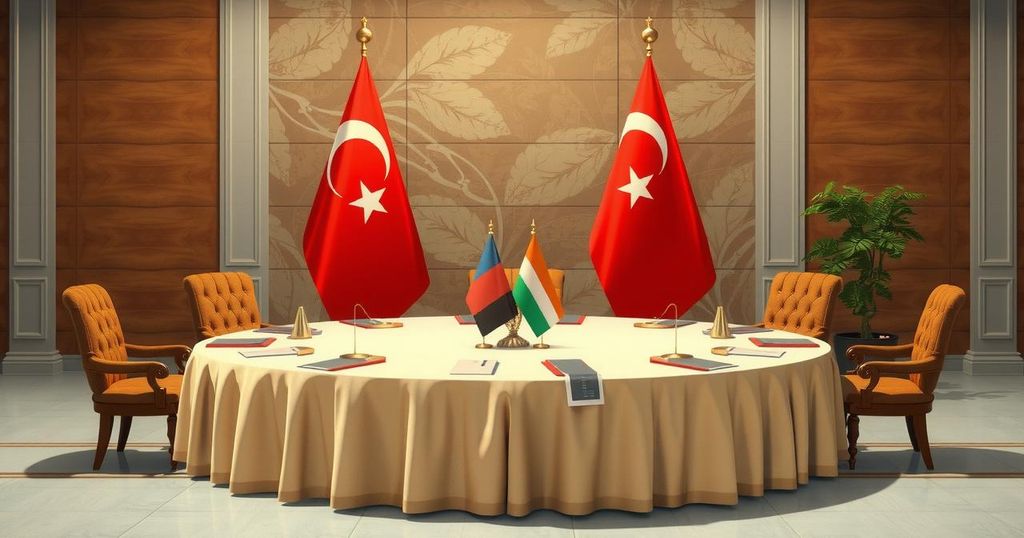Bangladesh’s caretaker Prime Minister, Muhammad Yunus, has sought Pakistan’s support to revive the dormant Saarc organization during a recent meeting with Pakistani Prime Minister Shehbaz Sharif. Saarc, which has not convened since 2016 largely due to India’s concerns over Pakistan’s alleged support for terrorism, remains a contentious topic. India’s refusal to participate in Saarc discussions presents significant hurdles for its revival, despite Bangladesh and Pakistan’s keen interest in enhancing trade relations amidst economic challenges.
Bangladesh’s caretaker Prime Minister, Muhammad Yunus, recently met with Pakistani Prime Minister Shehbaz Sharif, seeking Pakistan’s assistance to revive the South Asian Association for Regional Cooperation (Saarc). This regional organization, which includes eight South Asian countries, has not convened since 2016 due to ongoing tensions, particularly stemming from India’s concerns regarding Pakistan’s alleged support of terrorism. Despite Pakistan’s repeated calls to rejuvenate Saarc, India remains disinterested and has specifically cited security issues as a primary justification for its stance. Saarc was formed in 1985 to promote regional cooperation among member states: Bangladesh, Bhutan, India, the Maldives, Nepal, Pakistan, and Sri Lanka. The faltering of Saarc can be traced back to the aftermath of the 2016 Uri attack, during which 19 Indian soldiers were killed, leading India to withdraw from the proposed summit in Islamabad. This withdrawal was mirrored by other countries, including Bangladesh, Bhutan, Afghanistan, and Sri Lanka. Indian External Affairs Minister S. Jaishankar emphasized that India will not support a platform that allows for “terrorism by night and trade by day.” This stern position indicates that India is resolutely unwilling to engage in any cooperative effort with Pakistan unless significant changes regarding security can be assured. The recent interest from Bangladesh under Prime Minister Yunus signals a notable shift, as the previous administration under Sheikh Hasina had ceased efforts to promote Saarc due to similar concerns. Yunus has actively sought to engage with Pakistan to reinvigorate the regional body, reflecting economic ambitions as both countries face pressing economic challenges. With Pakistan facing extreme economic difficulties and Bangladesh grappling with recent setbacks attributed to corruption, the drive to revive Saarc appears to hinge on economic cooperation and the prospect of shared growth. While Pakistan and Bangladesh express a desire to elevate trade relations, driven by their respective economic needs, India remains positioned as a key player that they require. Given India’s ongoing economic growth, expected to surpass 7% annually, and its participation in multiple global forums including the G20 and Brics, India’s reluctance to engage meaningfully in Saarc emphasizes the bloc’s current limitations. In conclusion, the contrasting perspectives on Saarc among Bangladesh, Pakistan, and India underscore the complexities of regional politics in South Asia. Bangladesh’s approach to reviving Saarc in collaboration with Pakistan reflects a strategic pivot aimed at economic recovery, while India’s ongoing concerns over security issues significantly hinder any potential progress within the framework of Saarc.
The South Asian Association for Regional Cooperation (Saarc) is a regional intergovernmental organization established to promote economic and regional integration among its member states: Bangladesh, Bhutan, India, the Maldives, Nepal, Pakistan, and Sri Lanka. The grouping has faced challenges, particularly since its last summit in 2016, largely due to tensions between India and Pakistan regarding issues of terrorism and security. India has articulated its unwillingness to engage in multilateral discussions that include Pakistan until a secure environment can be established. Bangladesh’s recent overtures to Pakistan for Saarc’s revival signal a shift in regional dynamics and aims to address economic interests amidst the backdrop of longstanding political tensions.
In light of the discussions between Bangladesh and Pakistan regarding the revival of Saarc, it is evident that the aspirations for closer economic ties among these nations are tempered by India’s firm stance on security matters. As both Bangladesh and Pakistan seek to navigate their economic difficulties, the future of Saarc hangs in the balance against the backdrop of geopolitical tensions, particularly the unresolved issues surrounding terrorism and mutual trust among member states. India’s hesitance to reengage in Saarc, coupled with the other members’ interests in economic cooperation, paints a complex picture of the potential for regional collaboration in South Asia.
Original Source: www.indiatoday.in




